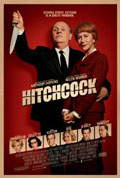
Directed by
Sacha Gervasi
98 minutes
Rated M
Reviewed by
Bernard Hemingway

Hitchcock
Synopsis: An account of the troubled relationship between Alfred Hitchcock (Anthony Hopkins) and his wife Alma Reville (Helen Mirren) during the filming of Psycho in 1959.
I don’t know how faithful to the facts is Sacha Gervasi's film and perhaps Hitchcock aficionadi may have some gripes in that department but that possible caveat aside, Hitchcock is a delightful film, modest in scale but perfectly-proportioned in all its parts, a film that like Richard Linklater’s Me And Orson Welles, takes a gracefully nostalgic and witty journey into Hollywood’s legendary past.
From Gervasi's stylish direction to John J. McLaughlin’s script, based on the book Alfred Hitchcock and the Making of Psycho, to Danny Elfman’s uncharacteristically subdued score there is much to appreciate in this film. For most, however, it will be the performances that stand-out.
Topping the bill is Anthony Hopkins in a performance that surprisingly did not win him an Oscar nomination, although you couldn’t say that, bar the broad strokes, Hopkins particularly looks like Hitch, he also doesn’t look like Anthony Hopkins. Yes, occasionally there is a glimpse of the well-known actor in an expression or the phrasing of a line but, with the help of an excellent make-up department, Hopkins has the iconic persona down to a tee and he never lets it go. Hannibal Lecter is a party trick in comparison.
Part of the fun of the film is the Cook’s tour of the Psycho set. Scarlett Johansson does a good Janet Leigh while James D'Arcy does an admittedly briefly seen but impeccable Anthony Perkins. Perhaps because Alma Reville is not known as a public identity, Helen Mirren remains pretty much herself although, needless to say, this is hardly a bad thing. She gives real emotional depth to the drama as a woman battling the likes of Grace Kelly and Kim Novak for the attention of her husband and saves the film from being simply a showcase of imitations. Mention should also be made here of an a effective although largely dialogue-less performance by Toni Collette as Hitch’s P.A.
Hitchcock is portrayed with affection although hardly as a saint. In fact he’s a self-centred sybarite and an insecure voyeur with persistent sexual desires that had nothing to do with his wife whom he resents at the same time as he depends on her. The very reasonable general premise of the film is that he put many of his anxieties into Psycho and the script nicely intertwines the on and off-set developments to bring this thesis off, culminating in a re-creation of the infamous shower scene.
There has been critical resistance to the inclusion of sequences in which Hitchcock has visitations from a phantasy Ed Gein (Michael Wincott), the real-life killer on whom the Norman Bates character was based. Yet as a kind of peek into the darker recesses of Hitchcock’s mind and the creative process in general, for me at least, they worked.
Whilst it is rather misleading to describe it as a bio-pic, Hitchcock is a beautifully mature, superbly well-crafted piece of film-making and a perfect antidote to the big-budgeted SFX fare that swaps the cinemas at this time of the year.

Want more about this film?


Want something different?




